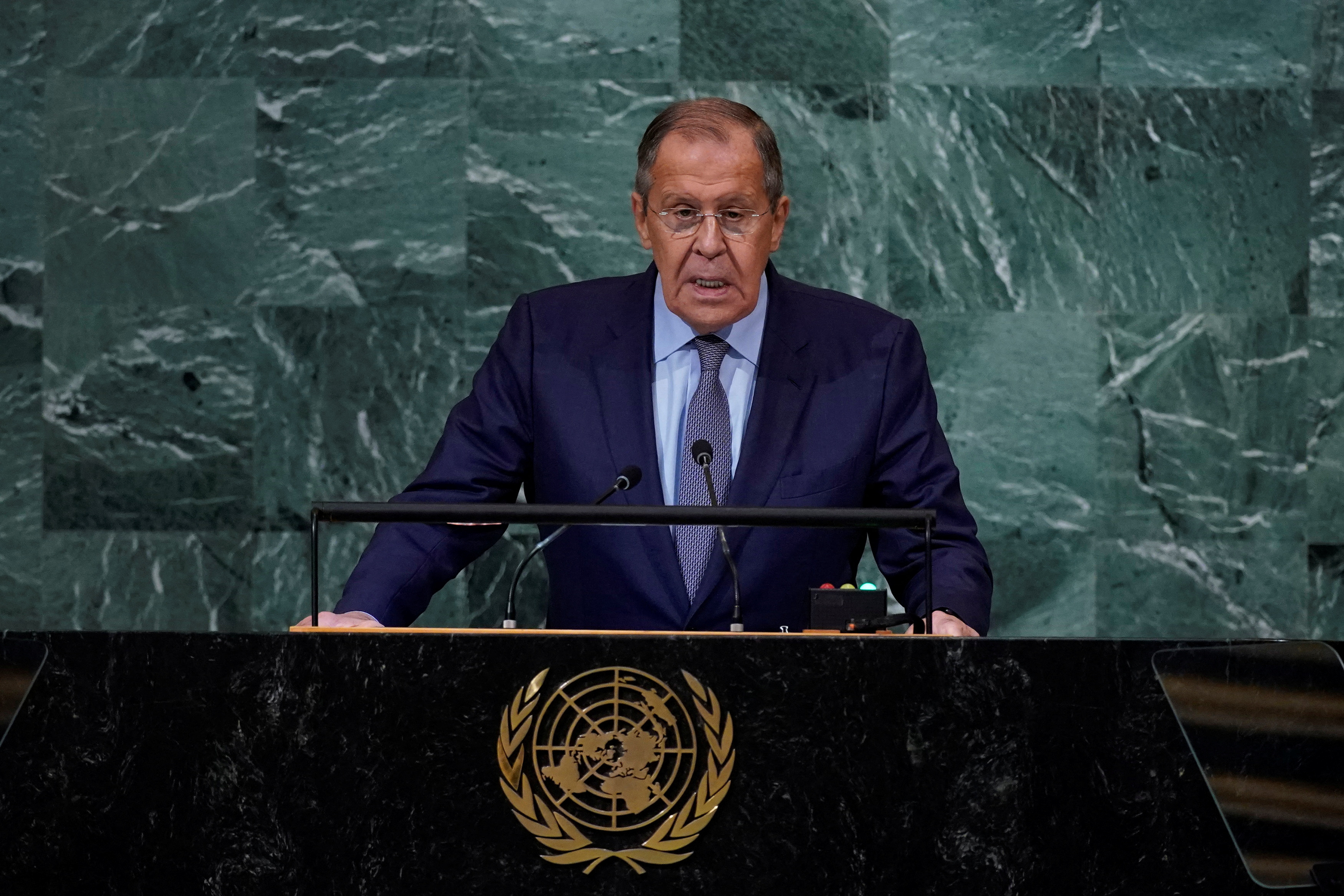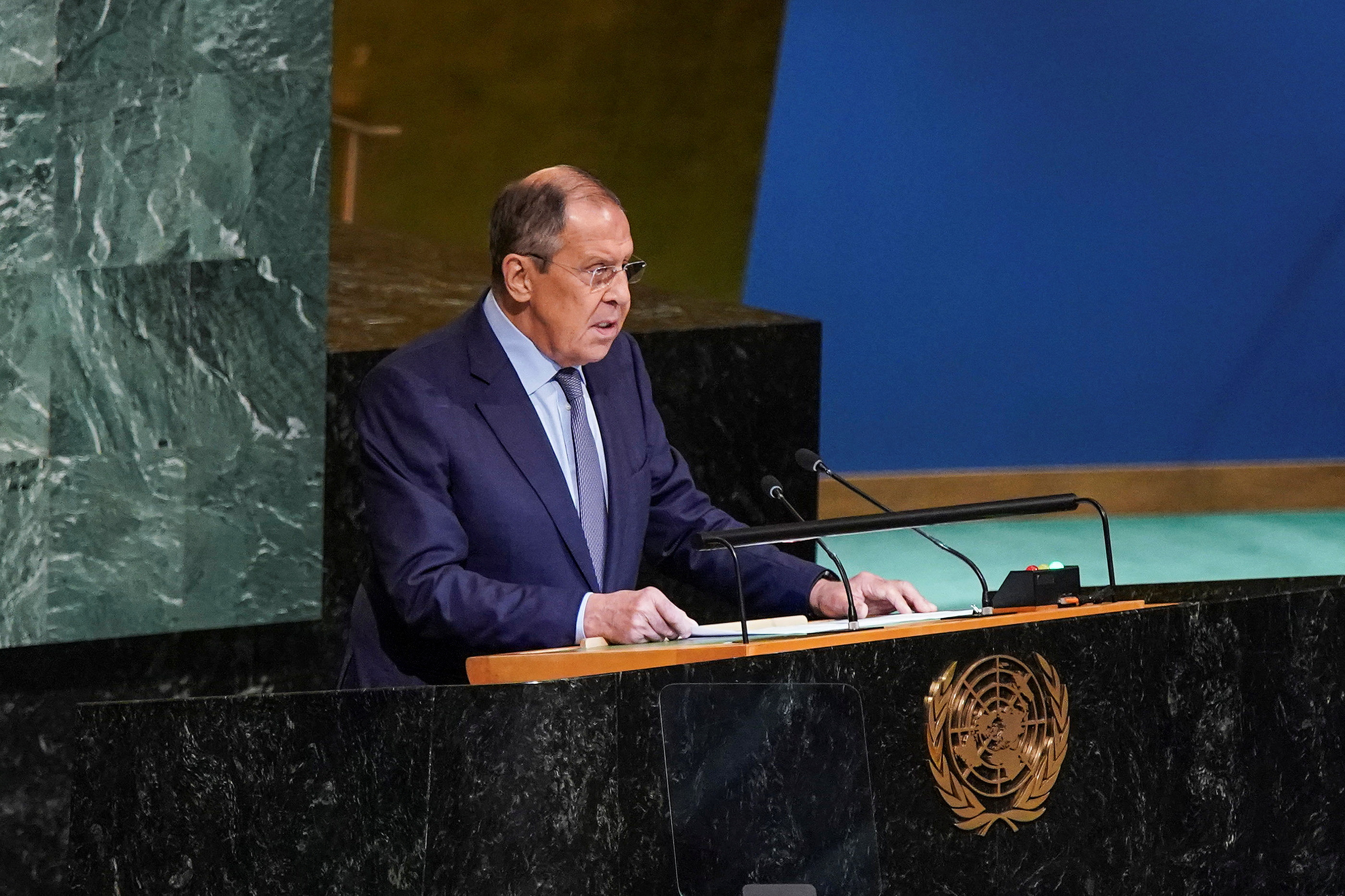Lavrov talks at UN, 750 arrested in Russia
Newslooks- MOSCOW- UNITED NATIONS (AP)
While Russian Foreign Minister Sergei Lavrov delivers his speech at United Nations General assembly, Russian police detained nearly 750 people, including over 370 in Moscow and some 150 in St. Petersburg, Police blocked peaceful protests against President Vladimir Putin’s military mobilization order, arresting hundreds, including some children, in scores of cities across the vast country, according to OVD-Info, an independent website that monitors political arrests in Russia.


Russian Foreign Minister Sergei Lavrov accused the United States of “playing with fire” around Taiwan in a speech sharply critical of Washington at the annual gathering at the United Nations. Lavrov said Washington was trying to turn the entire world into its own backyard through sanctions. The United States has imposed several rounds of sanctions on Moscow following the February invasion of Ukraine.

Russia made its case to the world Saturday for its war in Ukraine, repeating a series of grievances about its neighbor and the West to tell the U.N. General Assembly meeting of world leaders that Moscow had “no choice” but to take military action.



At the heart of Foreign Minister Sergey Lavrov’s address was a claim that the United States and its allies are aggressively undermining the international system that the U.N. represents — not, as the West maintains, the other way around.

“The future of the world is being decided today,” he said, and “the question is whether or not it is going to be the kind of order with one hegemon at the head of it.”

His speech was Russia’s chance to respond to days of denunciations from the podium at the premier annual gathering of presidents, premiers, monarchs and government ministers.

The war has largely dominated the discussion, with many countries laying into Russia for its Feb. 24 invasion, nuclear threats, allegations of atrocities and war crimes, and ratcheting up its campaign by mobilizing some of its reserves even as the assembly met.

The speech came amid voting in Russian-occupied parts of eastern and southern Ukraine on whether to join Russia. Moscow characterizes the referendums as self-determination, but Kyiv and its Western allies view them as Kremlin-orchestrated shams with a foregone conclusion.

Some observers think the expected outcome could serve as a pretext for Russian President Vladimir Putin eventually to escalate the war further.
“We can expect President Putin will claim any Ukrainian effort to liberate this land as an attack on so-called ‘Russian territory,’” U.S. Secretary of State Antony Blinken warned the U.N. Security Council on Thursday.

Russia has offered a number of explanations for what it calls a “special military operation.” Among them: risks to Russia from what it considers a hostile government in Kyiv and a NATO alliance that has expanded eastward over the years; restoring what Russia considers to be its historical territorial claims on the country; and protecting Russians living in Ukraine — especially its eastern Donbas region — from what Moscow views as the Ukrainian government’s oppression.

“The incapacity of Western countries to negotiate and the continued war by the Kyiv regime against their own people left us with no choice” but to recognize two separatist regions of Ukraine as independent and then to send troops in, Lavrov said.

The aim was “to remove the threats against our security, which NATO has been consistently creating in Ukraine,” he explained.

While Ukraine has recently driven Russian troops from some areas in the northeast, Ukrainian President Volodymyr Zelenskyy earlier this week warned the assembly that he believes Moscow wants to spend the winter getting ready for a new offensive, or at least preparing fortifications while mobilizing more troops.

Regardless, he declared that his forces will ultimately oust Russian troops from all of Ukraine.
“We can do it with the force of arms. But we need time,” said Zelenskyy, the only leader who was allowed to address the assembly by video this year.
The two countries also faced off this week at the Security Council, in a rare moment when Lavrov and his Ukrainian counterpart, Dmytro Kuleba, were in the same room — though they kept their distance.

The General Assembly voted overwhelmingly in March to deplore Russia’s aggression against Ukraine, call for immediate withdrawal of all Russian forces, and urge protection for millions of civilians. The next month, members agreed by a smaller margin to suspend Russia from the U.N. Human Rights Council.

In Russia, demonstrations followed protests that erupted within hours Wednesday after Putin, in a move to beef up his volunteer forces fighting in Ukraine, announced a call-up of experienced and skilled army reservists.

The Defense Ministry said about 300,000 people would be summoned to active duty, but the order left a door open to many more getting called into service. Most Russian men ages 18-65 are automatically counted as reservists.

On Saturday, police deployed in force in the cities where protests were scheduled by opposition group Vesna and supporters of jailed opposition leader Alexei Navalny. They moved quickly to arrest demonstrators, most of them young people, before they could hold protests.

In Moscow, a heavy contingent of police roamed a downtown area where a protest was planned under pouring rain and checked the IDs of passersby. Officers rounded up those they deemed suspicious and later distributed call-up summons to the men who were arrested.

A young woman climbed on a bench and shouted “We aren’t cannon fodder!” before police took her away.
Police detained a man in a park just outside Red Square and whisked him away as others shouted “Shame!”

Before being rounded up in St. Petersburg, a small group of demonstrators managed to briefly march along the main Nevsky avenue shouting “Putin into the trenches!”
In the city of Novosibirsk in eastern Siberia, over 70 people were detained after singing an innocuous Soviet-era song praising peace.

People who tried to hold individual pickets that are allowed under Russian law also were detained.
The quick police action followed the dispersal of Wednesday’s protests, when over 1,300 people were detained on Wednesday in Moscow, St. Petersburg and other cities.

Putin on Saturday signed a hastily approved bill that toughens the punishment for soldiers who disobey officers’ orders, desert or surrender to the enemy.








